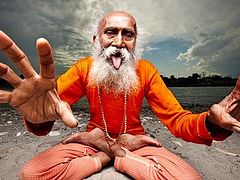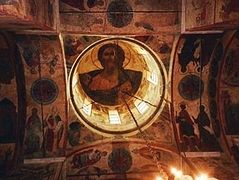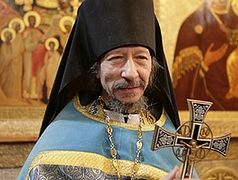One life did not work out—let’s live
another one?!
Or, on the superstition of reincarnation
(From a sermon on the Transfiguration)

There is a need for this, because even in church settings, and now occasionally in village churches as well, sad as it is, you find cases when in conversation with the priest, a person who considers himself an Orthodox Christian suddenly reveals that he (or she) believes that man lives more than once on the earth, and as various East Indian religious systems teach, can return to this life again and again.
Such people, whom I even find hard to call Orthodox, believe that a person’s soul can leave one body in order to then enter a new one—the tiny body of an embryo within its mother’s womb. In this manner, the person can as if be born again, and that is why he forgets about all his former incarnations. And so he comes and goes from this earth many, many different times, supposedly ever perfecting himself and finally attaining Nirvana, that is, complete merging with the Absolute, and more exactly, with complete non-being.
No doubt, this false theory that has reached us from India brings up many questions; for example: How did rational, self-aware personalities (that is, people’s souls) come to be, if the Hindu god himself is no more than a certain life principle, and not a rational, self-aware personality (that is, he is an impersonal god)? Who then created and determined the quantity of souls that have existed from the beginning? Where do the new souls come from that are needed to fill the new human bodies that have come about as a result of demographic growth of the earth’s population? After all, if you follow this teaching’s logic, the earth’s population should be static: as many souls as have been freed from their bodies due to death, so many should there be new bodies (and no more) ready to receive a soul and become a human. There are many other questions as well, but the saddest one consists in the fact that pseudo-Christian subscribers to the idea of incarnation try by citing Holy Scripture to prove with the Bible the objectivity of this truly diabolic theory.
In such cases they usually cite the ninth chapter of the Gospel of Mark, where it is told how right after the miracle of the Transfiguration, the three apostles who witnessed it came down with their Teacher from Mount Tabor, and asked Christ: Why say the scribes that Elias must first come? And he answered and told them, Elias verily cometh first, and restoreth all things; and how it is written of the Son of man, that he must suffer many things, and be set at nought. But I say unto you, That Elias is indeed come, and they have done unto him whatsoever they listed, as it is written of him. (Mk. 9:11-13). Explaining this passage, the cunning “reincarnationists” say, “There, do you see? This means that Elias the prophet was incarnate in a new body! His soul transmigrated to the body of John the Baptist, about whom Christ said, ‘Elias came, and you did with him as you wished’! After all, it was John the Forerunner who came before Christ, preached, and then was killed.”
The craftiness here, dear brothers and sisters, consists as always in the deliberately false explanation of the citation, taken out of the general context of the Holy Scriptures. However, the Church teaches that in order to properly understand one or another complex or controversial passage it is necessary to look at all analogous passages of the Scriptures that talk about the same thing. Only then will what they are saying become clear. So, what then is being said about John the Baptist and about Elias the Prophet in the Gospel of St. Luke? Let’s open the first chapter: But the angel said unto him, Fear not, Zacharias: for thy prayer is heard; and thy wife Elisabeth shall bear thee a son, and thou shalt call his name John. And thou shalt have joy and gladness; and many shall rejoice at his birth. For he shall be great in the sight of the Lord […] And he shall go before Him in the spirit and power of Elias (Lk. 1:13-17). From this text we learn that not man, and not even a prophet, but the very angel of God (according to the Church’s teaching it was the Archangel Gabriel) who completely debunks the mythological theory of the transmigration of the Prophet Elias’s soul into a new body.
From the words of the Archangel it becomes perfectly obvious that the new prophet, who is yet to be born, will have the same spiritual power as the Prophet Elias had, and acquire the same Divine Spirit. But besides this text we should take into consideration also the prophecy that was spoken long before the Birth of Christ by the Prophet Malachi concerning the future service of the Prophet Elias, who had been taken up by God from the material world into the spiritual world long before Malachi’s time. From Malachi’s prophecy it becomes clear that Elias the prophet will again appear on the earth directly before the end of the world and the onset of the Last Judgment. The Creator speaks precisely about this through the lips of the prophet: Behold, I will send you Elijah the prophet before the coming of the great and dreadful day of the Lord: And he shall turn the heart of the fathers to the children, and the heart of the children to their fathers, lest I come and smite the earth with a curse (Mal. 4:5-6).
This prophecy, as we have already said, is completely consistent with the Revelation of St. John the Theologian, and that is just how the entire fullness of God’s Church understands it. Thus we see, firstly, that Elias the prophet is preserved by God till the day of the Second Coming of Christ in his former, albeit changed body; secondly, that throughout the entire age up to that moment his soul did not transmigrate anywhere, and in fact it cannot transmigrate; and thirdly, that he will come in that same body. Well then, tell me any of you “reincarnationists” standing here: Into whom did the soul of Elias the Prophet transmigrate if he is now here on Mount Tabor, standing next to Christ and talking about His coming pain and suffering on the cross?...
But here is yet another proof of the falsehood of your theory of reincarnation, which you are trying to justify with the help of the Gospels. Next to Christ, the apostles see on Mount Tabor one other prophet of God—Moses. It would follow that throughout the entire fifteen centuries that passed from the day he died to the Birth of Christ, Moses did not reincarnate into a single other person?! Otherwise, it would not have been Moses standing there next to Christ but an entirely different person! Only it would be interesting to know which one, beginning from Moses. After all, during these fifteen centuries his soul should have gone through a multitude of bodily casings, each time not knowing anything at all about its previous incarnation. Just the same, Moses on Mount Tabor saw himself as Moses! And the apostles also knew that this was Moses. How did they know? Through the Spirit of God, of course. Thus, the appearance of the Prophets Elias and Moses during the Transfiguration of our Lord Jesus Christ show us plainly that no reincarnations ever existed and do not exist. This is an absolutely false theory. But who needs it?




There are Jews in India that it’s said to be a lost tribe and they weren’t in contact with the rest of Jewry ,so it’s not from them that this comes from